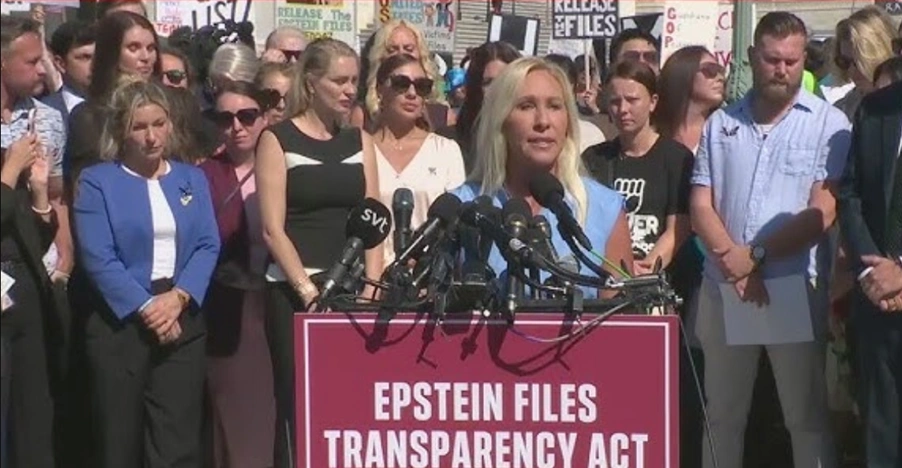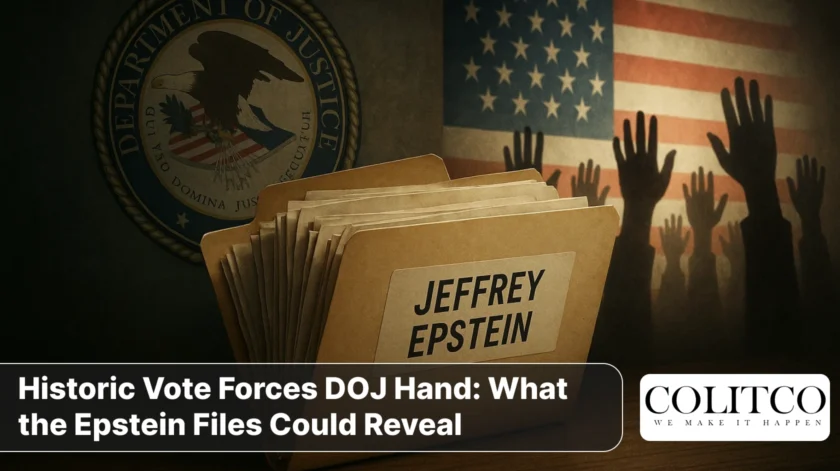Congress delivered a decisive blow to government secrecy on Tuesday, voting nearly unanimously to compel the Department of Justice to release all files related to convicted sex offender Jeffrey Epstein. The move comes after months of political wrangling and a dramatic last-minute reversal by President Donald Trump.
The House of Representatives passed the Epstein Files Transparency Act with a staggering 427-1 vote. Louisiana Republican Clay Higgins cast the sole dissenting ballot.
Hours later, the Senate agreed by unanimous consent to pass the measure as soon as it arrives from the House, clearing a path for the bill to reach Trump’s desk.
A Political Battle Won
The vote represents a rare bipartisan victory in an increasingly divided Washington. Republican Representatives Thomas Massie, Marjorie Taylor Greene and Lauren Boebert joined forces with Democratic Representative Ro Khanna to push the legislation forward.
The path to Tuesday’s vote was anything but smooth. Trump initially opposed the measure, with his White House warning that supporting it would be considered a “hostile act” against his administration.
House Speaker Mike Johnson delayed the vote for months, even postponing the swearing-in of newly elected Democrat Adelita Grijalva. Her delayed oath-taking became the 218th signature needed on a discharge petition to force the vote.
But facing inevitable defeat, Trump reversed course on Sunday. He posted on Truth Social urging Republicans to support the bill, declaring he would sign it into law.
Today’s vote to finally force the release of the Epstein files is a major victory for the survivors who’ve waited decades for the truth.
I stood with them this morning, the survivors who told the FBI, told law enforcement, begged for help, and were ignored.
This vote should’ve… pic.twitter.com/kcTo5EH0dv
— Rep. Marjorie Taylor Greene🇺🇸 (@RepMTG) November 18, 2025
What the Bill Mandates
The Epstein Files Transparency Act requires the Attorney General to release within 30 days:
- All unclassified records, documents and communications related to Epstein
- Materials concerning Ghislaine Maxwell, Epstein’s co-conspirator
- Flight logs and travel records
- Names of individuals referenced in the investigation
The Justice Department can withhold certain information to protect:
- Victims’ personal details and identifying information
- Materials that would compromise ongoing federal investigations
- Sensitive law enforcement methods and sources
Within 15 days of publication, DOJ must report to Congress detailing all categories of information released and withheld, plus a list of government officials and politically exposed individuals named in the materials.
Survivors Speak Out
Before Tuesday’s vote, Epstein abuse survivors stood outside the Capitol alongside lawmakers. They shared harrowing accounts of being trafficked as minors and their subsequent fight for justice.
Jena-Lisa Jones held up a photo of herself at 14, the age she met Epstein. “I was a child. I was in ninth grade. I was hopeful for life and what the future had held for me. He stole a lot from me,” she told reporters.
Several survivors directed criticism at Trump, saying he had politicised their fight. “We are hearing the administration say they intend to investigate various Democrats who were friends with Epstein. I beg you President Trump, please stop making this political,” Jones said.
After the Senate vote, survivors embraced in the Capitol gallery. Cheers erupted through the chamber as the final House tally was announced.

Photo of survivors with lawmakers at Capitol press conference
Trump’s Complicated Stance
The president’s position on the Epstein files release has shifted repeatedly. During his 2024 campaign, Trump promised to release the documents if re-elected, stating on podcasts hosted by Joe Rogan, Lex Fridman and others that he supported full transparency.
But after taking office, his tune changed. In July 2025, Attorney General Pam Bondi announced DOJ found “no incriminating client list,” contradicting her February claim that such a list sat on her desk.
When ABC News reporter Mary Bruce questioned Trump about why he wouldn’t release the files himself, he lashed out. He repeatedly insulted Bruce and called for ABC’s broadcast license to be revoked.
On Monday, Trump told reporters the Senate could “do whatever they want” with the vote. “I’m all for it,” he said from the Oval Office, though he maintained the push was a “hoax” intended to distract from Republican achievements.
Political Implications
The Epstein files saga has exposed deep divisions within American politics, pitting Trump loyalists against transparency advocates within the Republican Party.
Greene, once a staunch Trump ally, broke with the president over the issue. “I was called a traitor by a man that I fought six years for, and I gave him my loyalty for free,” she said Tuesday. “He called me a traitor for standing with these women and refusing to take my name off the discharge petition.”
House Oversight Committee Chairman James Comer revealed that House Minority Leader Hakeem Jeffries solicited meetings and campaign donations from Epstein after his conviction, highlighting how the scandal touches both parties.
What Happens Next
Trump indicated he will sign the bill when it reaches his desk. A senior White House official confirmed to Reuters that Trump plans to sign “whenever it gets to the White House.”
However, significant barriers remain to full public disclosure. Any materials related to ongoing investigations or covered by executive privilege claims will likely stay sealed.
Trump recently directed Attorney General Bondi to investigate Epstein’s ties to former President Bill Clinton, officials at JPMorgan Chase and others. The bill allows DOJ to withhold information interfering with ongoing federal investigations, potentially keeping some files secret indefinitely.
Legal experts note Trump could have ordered the release at any time without congressional action. His decision to wait for legislation suggests political calculations at play.
Also Read: Australia’s CSL Makes Bold US$2.3 Billion Bet on American Manufacturing Ahead of Tariff Storm
A Long-Awaited Reckoning
Epstein’s case has gripped America for years due to his connections to powerful figures in media, politics, academia and business. He died in his Manhattan jail cell in August 2019 while awaiting trial on sex trafficking charges. His death was ruled a suicide.
The political establishment has faced mounting pressure to reveal the full extent of Epstein’s network. Tuesday’s vote marks a significant step toward accountability, though questions remain about what will ultimately be disclosed.
Representative Massie told reporters: “We fought the president, the attorney general, the FBI director, the speaker of the House and the vice president to get this win.”
For survivors who have waited years for justice, the vote represents a hard-won victory, even as they brace for what the files might reveal about the powerful men who enabled Epstein’s crimes.












